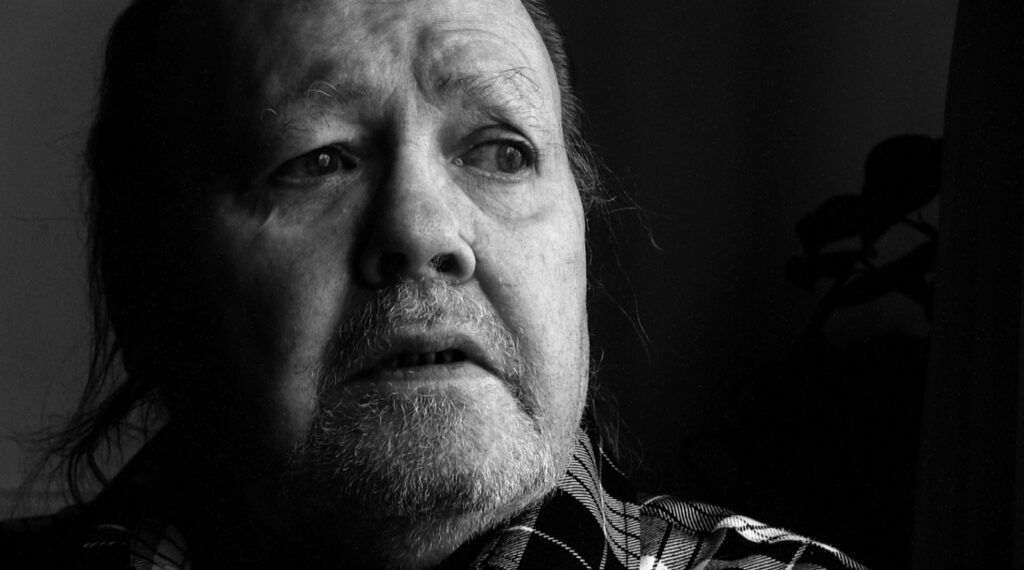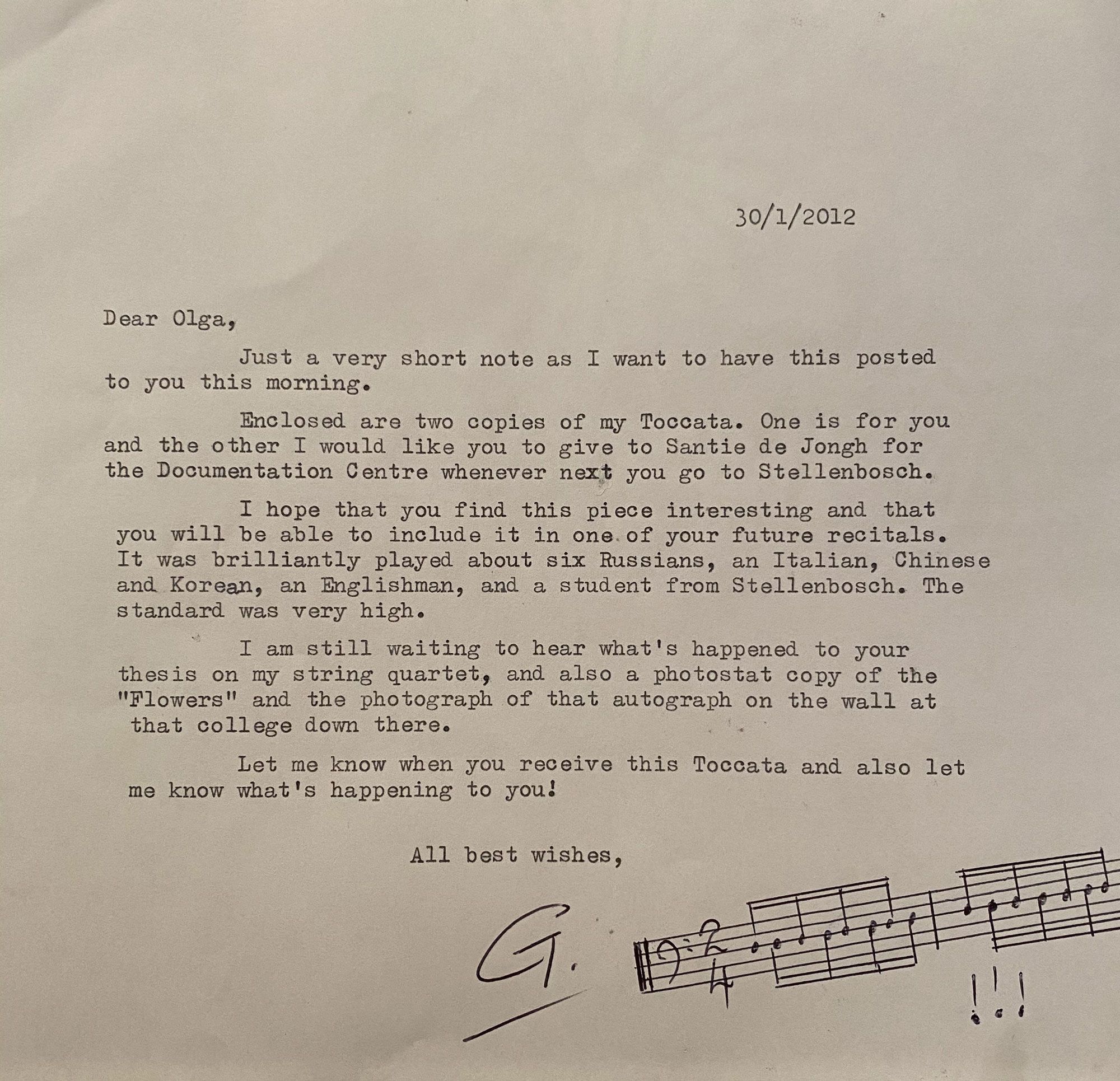OLGA LEONARD
The Leonard Street Meetings (2008-2012)
I ponder life
like frantic molecules
magnified beyond
man’s comprehension
Thoughts of a genius
twisted and macabre
hills and valleys
no ultimate linear
Like burning labyrinths
clutching at the mind
nowhere an answer
a vortex of pain
This poem by Graham Newcater is an accurate summary of my recollection of Graham. We worked together from 2008 to 2011.
I stumbled upon the name Graham Newcater in the search of a topic for my mini-dissertation while working towards my master’s degree in Performing Arts. I read through Composers in South Africa Today (Klatzow) and having a special interest in serial music, the chapter about Newcater caught my attention. I soon made up my mind that this will be an interesting study to pursue.

Getting hold of Graham was a different story: I contacted Amoré Steyn, who previously did some research in this field, and she provided a postal address. This was around March 2008, and although we were not as technologically driven as we are now, posting a letter was already quite outdated, and exciting!
Graham Newcater was born in Johannesburg on 3 September 1941, but his family relocated to Durban in 1948. He started piano lessons in Johannesburg, but continued with the clarinet in Durban on doctor’s orders. Graham suffered from Tuberculosis and the suggestion was to learn to breathe in a disciplined way.

Graham is largely a self-taught composer and actually a trained mechanical engineer. He had formal training after being awarded a SAMRO scholarship to study at the Royal College of Music. His interest in twelve-tone music started when he first heard the Violin Concerto by Alban Berg:
“I didn’t know what that was all about and so I listened to all these very strange sounds – not sounding like any music I have ever heard before which I didn’t understand at all, but nevertheless, I was very fascinated by this strange, compelling power. This made me realise that this is the sound world I want to inhabit.”
from a transcript I made of an interview between Stephanus Muller and Graham Newcater, 2008
I am sorry that I didn’t keep record of my side of the correspondence, but looking through my files I found many of Graham’s letters, the earliest one dating back to 12 May 2008.
Graham was immediately interested and helpful. I made an appointment to see him and drove from Pretoria to Kenilworth, Johannesburg one Friday morning. I got terribly lost, but eventually found my way to Leonard Street.

Graham, at the time, lived a very modest life. He had a telephone (landline) and wrote letters on his typewriter. He read the newspaper daily, but he wasn’t able to access news and information at his fingertips, and this cut him off from the academic music world.
Graham was eager to chat about his work. He was keen to hear news from the academic institutions and people working there. Our first meeting lasted several hours in which he entertained me with stories of Arnold van Wyk, his childhood, his career and showing me his collection of symphony scores. Graham also mentioned that he had recordings of most of his compositions (I was specifically working on the analysis of his First String Quartet), but these were on tapes, and his tape-recorder was broken. He trusted me with these and I endeavoured to have the recordings put on CD. I bought a CD player to take with on my next visit. Graham also gave permission for me to keep a copy of these recordings, for future reference.
I remember him being very generous with his knowledge and what he could contribute, he did. Graham and I spoke at length about poetry, art and traveling. He was always slightly amused when speaking about a poet or artist I did not know, especially since I advocated a computer and internet many times. It seems that I was the only one needing Google.
I moved to Cape Town in 2010 and I visited Graham twice more when I had meetings in Pretoria. I would fly to OR Tambo, rent a car, go straight to Leonard Street and catch up with Graham.

Graham often mentioned to me that he was not academically celebrated because he never taught at any of the universities as a full time lecturer, or held a resident composer position. I think it is quite normal that he yearned for recognition. I was very happy to be contacted by Stephanus Muller at Stellenbosch University in this regard: Graham had given him my contact details since they were planning to include Graham in their documentation centre for South African composers. I provided Stephanus with copies of recordings, original manuscripts and information.
In October 2011 Graham was invited to Stellenbosch to receive an award. The ceremony took the shape of a concert and Graham wrote Flowers from the Garden of Forever (dedicated to me) to be premiered at this concert. It is also interesting to note that this is not a twelve-tone composition but bitonal instead. It later formed the second movement of From the Garden of Forever. I had the honour of performing this premiere, as well as Three Pieces for Violin and Piano with violinist Tricia Theunissen. The evening was concluded with a cocktail party and this was the last time I saw Graham. Interestingly, Athol Fugard was also in the audience that evening. It was a memorable event that I will cherish forever.
Graham and I have since lost contact. I think of him often and always fondly.
“Music is all math anyway. Leave it to an engineer to find a smarter way to do it.”
